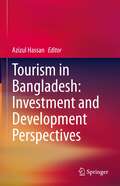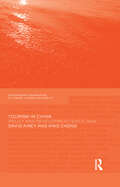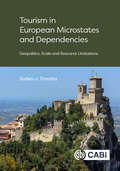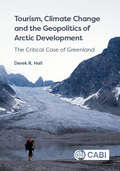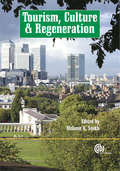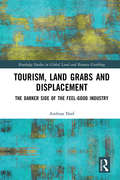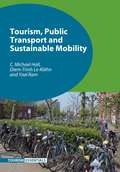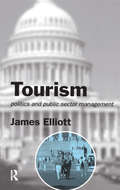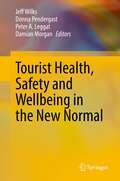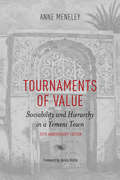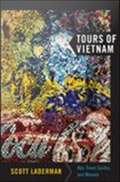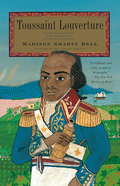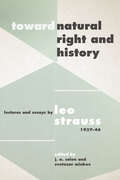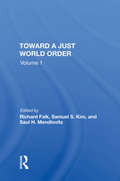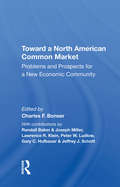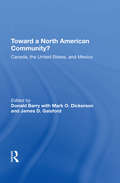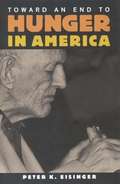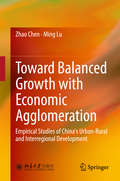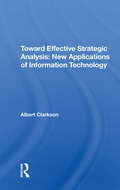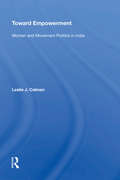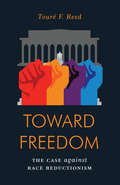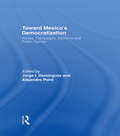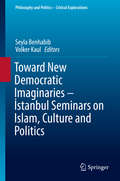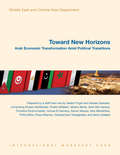- Table View
- List View
Tourism and Regional Development: New Pathways (Economic Geography Series)
by Maria GiaoutziTourist visits used to be a less common activity in the past. However, more people than ever now make leisure trips, making this an era of mass tourism. This drastic change in spatial behaviour is not only caused by economic prosperity, but the scale of this phenomenon means that it is able to generate economic growth, making tourism a key factor in regional development policy. One of the main challenges of current regional policy is to market the attractiveness of an area, thereby increasing tourist visits and subsequent revenue. In particular, regions are attempting this through the use of Information and Communication Technologies (ICT), which offer information on interesting places, and efficient methods for organizing and booking trips. This book examines the interconnections between tourism, ICT and regional development. Bringing together a range of European case studies illustrating various ICT and policy innovations, it not only critiques current activity by regions in terms of tourism development, but also considers how this sector is likely to continue to grow.
Tourism in Bangladesh: Investment and Development Perspectives
by Azizul HassanThis edited volume uniquely explores the extensive themes and frameworks of tourism development and investment in Bangladesh. The book focuses on outlining the present investment and development scenario of Bangladesh in order to suggest some solutions to current issues. Considering that Bangladesh has a population of over 170 million, the country possesses an abundance of possibilities for tourism. In recent years, Bangladesh has experienced steady growth in its economy and socio-cultural developments. Currently, there is very limited knowledge of or research into tourism in Bangladesh, even though it is a multifaceted and fast-growing industry.This book makes an important contribution to representing and exploring diverse aspects of tourism in Bangladesh for local and international benefit. This book provides insights into the stronghold of a social class having the ability to spend for tourism and leisure activities, which has prompted the country to pay further attention to the development of its tourism industry. This book emphasizes that the importance of tourism is undeniably on a continuous rise in Bangladesh, which in turn deserves the appropriate attention from academic research.
Tourism in China: Policy and Development Since 1949 (Contemporary Geographies of Leisure, Tourism and Mobility)
by David Airey King ChongTourism in China has grown rapidly since the country started implementing its open-door policy in 1978. Tourism development is now an essential agenda item for the Chinese government's plan for economic & social growth. Policy and policy-making for tourism therefore provides the essential background to understand tourism development in China. This is the first book to set the development of tourism in China since 1949 in its policy context. Underpinned by a strong conceptual framework, this systematic study of China contributes to an in-depth understanding of how public policy-making for tourism works and how it affects the development of tourism in the real world. The text explores tourism policy during three distinct leadership periods since creation of the People’s Republic of China in 1949: Mao Zedong (1949-1978); Deng Xiaoping (1978-1997) and the Collective Leadership Era (1997-the present). The attitudes and values of leaders and central government agencies towards tourism are considered, as well as the interactions of ideological orthodoxies, socio-economic conditions and institutions in their influence on national policy-making and tourism development. A separate chapter is devoted to policy-making in China’s two Special Administrative Regions, Hong Kong and Macau, as well as Taiwan due to its political separation from the Mainland, and Tibet, given its distinctive characteristics. Drawing on China’s experience over sixty years the book concludes with both theoretical and practical implications for tourism policy-making. This timely volume offers important insights into China’s Tourism as well as contributing to a wider pattern of debates about the respective roles of government policy and the market in the past and future. The material draws on exclusive in-depth interviews with key informants in China and on government documents and official sources not generally available in the international literature. This will be of interest to higher level students, academics & researchers within Tourism, Policy studies, Politics, Geography and China Studies.
Tourism in European Microstates and Dependencies: Geopolitics, Scale and Resource Limitations
by Dallen J TimothyTourism in European Microstates and Dependencies carefully examines the nuances and realities associated with tourism, social and economic development, geography, and geopolitics of Europe's smallest microstates and dependencies. Through case study-based material, the book covers the smallest states of Europe, the European dependencies inside Europe, and other unique territorial anomalies and unrecognized de facto states. It looks at how, besides small size and economy of scale, one of the characteristics that connects these unique states and territories is their dependence on tourism, or their desire to develop it, for their socio-economic well-being. This book provides a thorough overview of tourism-related challenges and opportunities associated with smallness/scale, limited population size, economic development, cross-border cooperation (dependency) with larger neighbour states, relationships with the European Union, geopolitical challenges, questions of sovereignty, vulnerability, and touristic importance on the world stage. It provides a comprehensive examination of the smallest states and state-like entities in Europe. It examines the social, economic, and political importance of tourism in some of the smallest countries and territories in the world. It is the first book of its kind to look systematically at small, yet extremely important, areas of Europe from tourism, socio-economic, and geopolitical perspectives. Coverage includes Andorra, Liechtenstein, Monaco, San Marino, the Vatican City, Åland, Akrotiri and Dhekelia, the Faroe Islands, Gibraltar, Guernsey, Isle of Man, Jersey, Svalbard, Llívia, Campione d'Italia, Transnistria, Abkhazia, and South Ossetia, as well as several other enclaves, autonomous areas, and unrecognized 'micro-nations'. This book will be an invaluable resource for post-graduate students and research scholars in the areas of tourism, geography, political science, and European studies.
Tourism, Climate Change and the Geopolitics of Arctic Development: The Critical Case of Greenland
by Derek HallGreenland is becoming a critically important territory in terms of tourism, climate change and competition for resource access, yet it has been poorly represented in academic literature. Tourism now features as a major source of income for the territory alongside fisheries. Cruise tourism is increasing rapidly, and might superficially appear to be best suited to Greenlandic conditions, given the lack of large-scale accommodation infrastructure and almost non-existent land routes between settlements. Ironically, one of the most spectacular tourist attractions is the large number of icebergs that are being calved as the result of glacier retreat and ice cap melting, both appearing to be taking place at ever increasing rates. As a consequence of ice removal, the territory's claimed extensive range of mineral resources, not least rare earth elements and hydrocarbons, are becoming more accessible for exploitation and, thereby, are acting increasingly as the focus for geopolitical competition. This book explores the nature of dynamics between tourism, climate change and the geopolitics of natural resource exploitation in the Arctic and examines their interrelationships specifically in the critical context of Greenland, but within a framework that emphasises the wider global implications of the outcomes of such interrelationships. This book is the first to explore these interrelationships in depth in English.
Tourism, Culture, and Regeneration
by Melanie K. SmithSustainable and integrated regeneration in the context of culture and tourism is explored for the first time within this book. The text is enhanced by international case studies.
Tourism, Land Grabs and Displacement: The Darker Side of the Feel-Good Industry (Routledge Studies in Global Land and Resource Grabbing)
by Andreas NeefThis book examines the global scope of tourism-related grabbing of land and other natural resources. Tourism is often presented as a peaceful and benevolent sector that brings people from different cultural backgrounds together and contributes to employment, poverty alleviation, and global sustainable development. This book sheds light on the lesser known and much darker side of tourism as it unfolds in the Global South. While there is no doubt that tourism has been an engine of economic growth for many so-called developing countries, this has often come at the cost of widespread dispossession and displacement of Indigenous and non-indigenous communities. In many countries of the Global South, tourism development is increasingly prioritised by governments, businesses, international financial institutions and donors over the legitimate land and resource rights of local people. This book examines the actors, drivers, mechanisms, discourses and impacts of tourism-related land grabbing and displacement, drawing on more than thirty case studies from Latin America and the Caribbean, sub-Saharan Africa, South and Southeast Asia, the Middle East and the Southwest Pacific. The book provides solid grounds for an informed debate on how different actors are responsible for the adverse impacts of tourism on land rights infringements, what forms of resistance have been deployed against tourism-related land grabs and displacement, and how those who have violated local land and resource rights can be held accountable. Tourism, Land Grabs and Displacement will be essential reading for students and scholars of land and resource grabbing, tourism studies, development studies and sustainable development more broadly, as well as policymakers and practitioners working in those fields.
Tourism, Public Transport and Sustainable Mobility
by C. Michael Hall Diem-Trinh Le-Klähn Yael RamThis book offers a comprehensive global examination of the relationship between public transport and tourism as well as exploring other sustainable transport modes. It offers a unique view by analysing tourism through the public transport lens and vice versa. The volume provides an account of how the public transport experience can be improved for tourists so that its value can be maximised and a greater number of people can be encouraged to shift modes. It features a wide range of case studies and examples showing how the tourism industry, as well as regional economies, communities and the environment, benefit when public transport is widely used by tourists. The book will be of interest to researchers and students in the fields of tourism and transport as well as destination marketing organisations and tourism, transport and urban planners.
Tourism: Politics and Public Sector Management (Public Sector Management Ser.)
by James ElliottTourism looks set to replace oil as the most important global industry. James Elliot explores the ways in which governments of both developed and developing countries manage this increasingly diverse and volatile industry, providing a historic and economic overview as well as the reasons why and how governments are involved in tourism management.Using case studies from the UK, Australia and the Third World this wide ranging book covers: policy-making and planning; local governments; airlines and airports; and environmental control and sustainable development. Detailed information boxes and excerpts of official documents illustrate government management of the tourism system and provide critieria for evaluation
Tourist Health, Safety and Wellbeing in the New Normal
by Donna Pendergast Jeff Wilks Peter A. Leggat Damian MorganThe COVID-19 pandemic has changed the face of international and domestic tourism and sharply focused attention on the importance of tourist health, safety and wellbeing like never before. This book offers a unique perspective on the challenges facing the world’s largest service industry to protect and care for customers in a rapidly evolving environment where borders have closed, social distancing rules apply and personal hygiene has become a key focus in everyday life. Yet tourism is a very resilient industry and history shows there is always an immediate surge toward recovery after a crisis has passed. Humans want to travel and see the world. While we appreciate that the pandemic is far from over, already there are reports of pent-up demand for travel as restrictions ease at some destinations and borders begin to open. As we move hopefully toward the recovery phase and people begin to move around for business and pleasure, this book presents the reader with key information and insights in both traditional and emerging areas of tourist health, safety and wellbeing, recognising that the world is now shaped by this pandemic, bringing change, potentially enduring benefits and lasting legacies.
Tournaments of Value: Sociability and Hierarchy in a Yemeni Town
by Anne MeneleyA significant contribution to our understanding of the varied experience of women in the Islamic Middle East, Tournaments of Value gives a careful description of a world of female socializing, and the velocity, energy, and elaborateness of this remarkable female social world. Meneley's data challenges assumptions about the cross-cultural validity of a division between household and community, between domestic and public domains. She demonstrates the fluidity of social life, the shifting nature of community organization, and in doing so provides a welcome counterpoint to more rigid formulations of Middle Eastern social structure usually expressed in ethnographies. Tournaments of Value incorporates vignettes to illustrate more analytical points and to enliven the text, allowing the reader to enter fully into the rich world of Zabid in Yemen. This expanded 20th anniversary edition introduces this seminal work on Middle Eastern ethnography and women's studies to a new generation of readers.
Tours of Vietnam: War, Travel Guides, and Memory
by Scott LadermanIn Tours of Vietnam, Scott Laderman demonstrates how tourist literature has shaped Americans' understanding of Vietnam and projections of United States power since the mid-twentieth century. Laderman analyzes portrayals of Vietnam's land, history, culture, economy, and people in travel narratives, U. S. military guides, and tourist guidebooks, pamphlets, and brochures. Whether implying that Vietnamese women were in need of saving by "manly" American military power or celebrating the neoliberal reforms Vietnam implemented in the 1980s, ostensibly neutral guides have repeatedly represented events, particularly those related to the Vietnam War, in ways that favor the global ambitions of the United States. Tracing a history of ideological assertions embedded in travel discourse, Laderman analyzes the use of tourism in the Republic of Vietnam as a form of Cold War cultural diplomacy by a fledgling state that, according to one pamphlet published by the Vietnamese tourism authorities, was joining the "family of free nations. " He chronicles the evolution of the Defense Department pocket guides to Vietnam, the first of which, published in 1963, promoted military service in Southeast Asia by touting the exciting opportunities offered by Vietnam to sightsee, swim, hunt, and water-ski. Laderman points out that, despite historians' ongoing and well-documented uncertainty about the facts of the 1968 "Hue Massacre" during the National Liberation Front's occupation of the former imperial capital, the incident often appears in English-language guidebooks as a settled narrative of revolutionary Vietnamese atrocity. And turning to the War Remnants Museum in Ho Chi Minh City, he notes that, while most contemporary accounts concede that the United States perpetrated gruesome acts of violence in Vietnam, many tourists and travel writers still dismiss the museum's display of that record as little more than "propaganda. "
Toussaint Louverture: A Biography
by Madison Smartt BellIn 1791, Saint Domingue was both the richest and cruelest colony in the Western Hemisphere; more than a third of African slaves died within a few years of their arrival there. Thirteen years later, Haitian rebels declared independence from France after the first--and only--successful slave revolution in history. Much of the success of this uprising can be credited to one man, Toussaint Louverture--a figure about whom surprisingly little is known. In this fascinating biography, the first about Toussaint to appear in English in more than fifty years, Madison Smartt Bell combines a novelist's passion for his subject with a deep knowledge of the historical milieu that produced the man. Toussaint has been known either as a martyr of the revolution or as the instigator of one of history’s most savagely violent events. Bell shatters this binary perception, producing a clear-eyed picture of a complicated figure. Toussaint, born a slave, became a slaveholder himself, with associates among the white planter class. Bell demonstrates how his privileged position served as both an asset and a liability, enabling him to gain the love of blacks and mulattoes as "Papa Toussaint" but also sowing mistrust in their minds. Another of Bell's brilliant achievements is demonstrating how Toussaint’s often surprising actions, such as his support for the king of France even as the French Revolution promised an end to slavery and his betrayal of a planned slave revolt in Jamaica, can be explained by his desire to achieve liberation for the blacks of Saint Domingue. This masterly biography is a revelation of one of the most fascinating and important figures in New World history.
Toward "Natural Right and History": Lectures and Essays by Leo Strauss, 1937–1946
by Leo Strauss J. A. Colen Svetozar MinkovNatural Right and History is widely recognized as Strauss’s most influential work. The six lectures, written while Strauss was at the New School, and a full transcript of the 1949 Walgreen Lectures show Strauss working toward the ideas he would present in fully matured form in his landmark work. In them, he explores natural right and the relationship between modern philosophers and the thought of the ancient Greek philosophers, as well as the relation of political philosophy to contemporary political science and to major political and historical events, especially the Holocaust and World War II. Previously unpublished in book form, Strauss’s lectures are presented here in a thematic order that mirrors Natural Right and History and with interpretive essays by J. A. Colen, Christopher Lynch, Svetozar Minkov, Daniel Tanguay, Nathan Tarcov, and Michael Zuckert that establish their relation to the work. Rounding out the book are copious annotations and notes to facilitate further study.
Toward A Just World Order
by Richard FalkThis text is designed to provide students with a solid theoretical and methodological base for understanding how the present international system works, how that system is likely to evolve given current world trends, and what realistically can be done to alleviate the most serious global problems. Part 1 develops a world order perspective by examin
Toward A North American Common Market: Problems And Prospects For A New Economic Community
by Charles F BonserThis is an examination of both the advantages and the problems posed by the notion of a North American economic union. Scholars and government representatives from the United States, Canada and Mexico exchange views and explore not just the economic implications but also the likely social and political consequences of economic integration. A varie
Toward A North American Community?: Canada, The United States, And Mexico
by Donald BarryThe North American Free Trade Agreement (NAFTA) is a milestone in the affairs of the continent and in international trade. The first formal arrangement of any kind between Canada, the United States, and Mexico, it is also the first trade pact including countries of such disproportionate power and levels of development. For Canada and Mexico the agr
Toward An End To Hunger In America
by Peter K. EisingerCheap, plentiful food is an American tradition. We spend a smaller percentage of our income on food than any other nation. We feed much of the world with our surpluses. Consumers, retailers, and restaurants throw away one-quarter of our food stock every year. And yet data collected by the federal government show that almost 12 percent of American households either suffer from hunger or worry about going hungry. Why are so many Americans afflicted with "food insecurity" during such prosperous times? According to this book, it's not simply an artifact of poverty: even most of the poorest homes have access to adequate food. Nor is it indifference to their plight or a lack of ways to help: Americans strongly support government food assistance, and there are a host of public and private programs devoted to feeding the hungry. Peter Eisinger seeks to unravel the puzzle of America's hunger and asserts that it is a problem that can be solved. He believes that the perception of hunger and responses to it emerge from a complex, intellectual, political, and social context. He begins by looking for a meaningful definition of hunger, then examines the structure and funding of government food assistance programs, the roles of Congress and community interest groups, and the contributions of volunteer organizations. He concludes by offering ideas to reduce the nation's perplexing hunger problem, based on creating stronger partnerships between public and private food programs.
Toward Balanced Growth with Economic Agglomeration
by Ming Lu Zhao ChenThis book explains the relationships between equality and efficiency, as well as between government and market, in urban-rural and regional development by providing theoretical frameworks and empirical evidence. Urban-rural development in China is understood from a regional perspective, while the core issue of urban-rural and regional development is cross-regional resource reallocation driven by the trends of globalization, marketization and urbanization and their influence on growth and inequality. The book puts forward the following arguments: An urban-rural and regional balance should not be achieved by limiting agglomeration effects in eastern regions. For some time now, China has lacked a suitable mechanism to enable residents in underdeveloped and rural areas to share in the achievements of economic agglomeration. As a result, China should not slow down economic agglomeration and development in eastern regions simply by depending on administrative means to balance urban-rural and regional development. In the final analysis, arriving at a regional balance depends on growth in the eastern regions, provided a reasonable mechanism is implemented to enable inland areas to share in the development achievements of eastern regions. In turn, finding an urban-regional balance rests on urban development, as long as more rural workers can move to and prosper in cities.
Toward Effective Strategic Analysis: New Applications Of Information Technology
by Albert ClarksonExploring the future of strategic analysis, this book identifies problems at the heart of the historical U.S. failure to perform effective strategic analysis, then explains and dramatizes how new applications of information technology can make significant progress possible. Certain specific limitations of human memory, says the author, are major ca
Toward Empowerment: Women And Movement Politics In India
by Leslie J CalmanAnalyzing Indian women's groups as one sector of a complex of new grass-roots, non-party political movements, Dr. Caiman considers why and how a women's movement evolved in India when it did. She describes the nature, origins, and meanings of the movement for Indian women and discusses the movement's significance for Indian politics in general as w
Toward Freedom: The Case Against Race Reductionism
by Toure ReedThe fate of poor and working-class African Americans-who are unquestionably represented among neoliberalism's victims-is inextricably linked to that of other poor and working-class AmericansReed contends that the road to a more just society for African Americans and everyone else is obstructed, in part, by a discourse that equates entrepreneurialism with freedom and independence. This, ultimately, insists on divorcing race and class. In the age of runaway inequality and Black Lives Matter, there is an emerging consensus that our society has failed to redress racial disparities. The culprit, however, is not the sway of a metaphysical racism or the modern survival of a primordial tribalism. Instead, it can be traced to far more comprehensible forces, such as the contradictions in access to New Deal era welfare programs, the blinders imposed by the Cold War, and Ronald Reagan's neoliberal assault on the half-century long Keynesian consensus.
Toward Mexico's Democratization: Parties, Campaigns, Elections and Public Opinion
by Jorge I. Domínguez Alejandro PoiréFirst Published in 1999. Routledge is an imprint of Taylor & Francis, an informa company.
Toward New Democratic Imaginaries - İstanbul Seminars on Islam, Culture and Politics
by Seyla Benhabib Volker KaulThis volume combines rigorous empirical and theoretical analyses with political engagement to look beyond reductive short-hands that ignore the historical evolution and varieties of Islamic doctrine and that deny the complexities of Muslim societies' encounters with modernity itself. Are Islam and democracy compatible? Can we shed the language of 'Islam vs. the West' for new political imaginaries?The authors analyze struggles over political legitimacy since the Arab Spring and the rise of Al Qaeda and ISIS in their historical and political complexity across the MENA (Middle East and North Africa) region. Distinguishing multiculturalism from interculturalism and understanding multiple modernities, philosophers in the volume tease out the complexities of civilizational encounters. The volume also shows how the Paris massacres or the Danish caricature controversy do not remain confined to Europe but influence struggles and confrontations within Muslim societies. Gender and Islam are addressed from a comparative perspective bringing into conversation not only the experience of different Muslim countries with Islamic law but also by analysing Jewish family law.
Toward New Horizons: Arab Economic Transformation Amid Political Transitions
by International Monetary FundA report from the International Monetary Fund.

